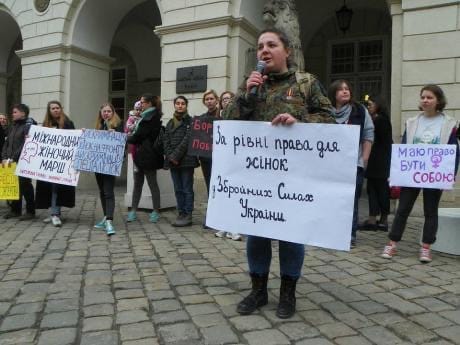How the War Against Russia Gave Women Rights in the Ukrainian Military

By Olympia Belengri, BA International Relations and Development Studies
The war sparked by the Russian occupation of Crimea in 2014 reformed the structure of the Ukrainian army. Due to underfunding of the Ukrainian armed forces, military operations against Russian aggression were initially formed partially out of grass-roots volunteer battalions.
The shadow war against the Kremlin’s power-grab, to which inadequate international attention had been given until recently, largely fell upon the hands of Ukrainian civil society to fight.
As conservative Russian groups have contested the existence of independent Ukraine since 1991, Ukrainians not only fight for their sovereignty but for the persistence of their identity and culture. Ideas of a non-existing Ukrainian culture are aggressively furthered by Vladimir Putin’s imperial narrative of the relations between the countries, re-constructing historical relations in a tsar-like tone.
Putin not only condemns Ukrainian sovereignty but denies that the country ever had any own traditions as a state. The conflict with Russia is a fight for the persistence of Ukrainian society, dating back much further than 2014 in terms of defending the Ukrainian identity. This history undoubtedly shaped the structure of the war, but little media attention has been given to how it enabled reform within Ukrainian society.
This narrative obscures the agency of Ukrainian women in the war. As past and recent news focus on male combatants, I wonder, what about the women? Currently, women officially make up for around 10% of the armed forces – numbers excluding the reproductive and unpaid labour of women in the military sphere.
Due to the vast involvement of Ukrainian civil society in the mobilisation to battle Russian aggression, a political opportunity arose for Ukrainian women to tackle traditional military gender roles, leading to a broader questioning of the rights and portrayal of women in Ukraine’s national consciousness.
As in the case of many men who joined the Ukrainian forces in recent years, numerous women found themselves at the front after 2014 with no aspirations of going into the military before. To clarify: writing about the agency of Ukrainian women in the military is in no way a celebration of armed conflict. It is, more than anything, a much-needed female-centred perspective on the dynamics of the war and a small account of the reality in Ukraine.
To provide some background, the increase of women in Ukrainian military operations post-2014 brought the former highly discriminatory legal framework of the Ukrainian Ministry of Defence to light.
Women were legally seen as too delicate to carry heavy loads, singling them out to perform traditional female roles as nurses or in the service of male soldiers. In some cases, the conditions led to women serving unofficially, teaming with volunteer battalions that sometimes held right-winged, white-nationalist reasons to fight.
The increased need for women in the military highlighted further inequalities in terms of ranking. As of 2017, the Ukrainian Armed Forces had over 20 000 women officially serving – around 8% of its total troop number – but only 0,1% of women in the military had been promoted to officer rank, whereby none had risen to become generals.
The social exclusion from the army fused feminist movements – later supported by the Ukrainian parliament – to act, as women found themselves risking their lives at the front in radically more precarious working conditions than their male counterparts.
Needless to say, the trend of increased female involvement in the military being followed by modest recognition of female achievement is nothing new – feminist IR scholars have produced numerous groundbreaking works on the issue for decades.
By underlining the need for female military services in the war with Russia, women in Ukraine could advance ideas of gender equality by protesting the discriminatory nature of the armed forces. Building on previous societal changes in Ukraine, illustrated by the Ukrainian revolution, grass-roots projects depicted the precarious reality for Ukrainian women in the military.
Notably, the report ‘Invisible Battalion: Women’s Participation in ATO Military Operations’ (2015), created by the female-led project The Invisible Battalion, highlighted the underrepresentation of women in the military in media coverage and public discussion. To little surprise, the report also states that it led to an obscurement of the role of women in military infrastructure overall.
With extensive movements forming for equal rights in the military, legal and discursive change came. In 2018, a bill initially drafted by a cross-party women’s group got passed, ‘ensuring equal rights and opportunities of women and men during military service in the armed forces.’
New research has since been conducted on the situation of women serving in the military. The Invisible Battalion Project produced two additional reports after 2015 on the psychological aftermath of the war for female veterans and wartime sexual harassment, both supported by UN Women.
The crucial insight to take from this is that the crisis not only forced civil society to take arms for the survival of Ukraine but also to fight for what kind of society Ukraine aspires to be.
In light of the brutal conditions facing Ukraine after the Russian invasion last week, we must be careful not to welcome a detached, victimising image of its society, nor judge the people’s need to fight for the privilege of independent existence.
“Allowing space for the personal in international politics opens the opportunity of seeing war for what it is – inevitably intertwined with the realities of the people fighting”
Despite the ignorance of the West, Ukraine has been fighting this war for years, finding ways to persist, progress, and grow in crisis. Allowing space for the personal in international politics opens the opportunity of seeing war for what it is – inevitably intertwined with the realities of the people fighting.
Photo Caption: A woman holds a sign reading: ‘We need equal rights for women in the military forces of Ukraine’ at a protest (Credit: Ganna Grytsenko).



